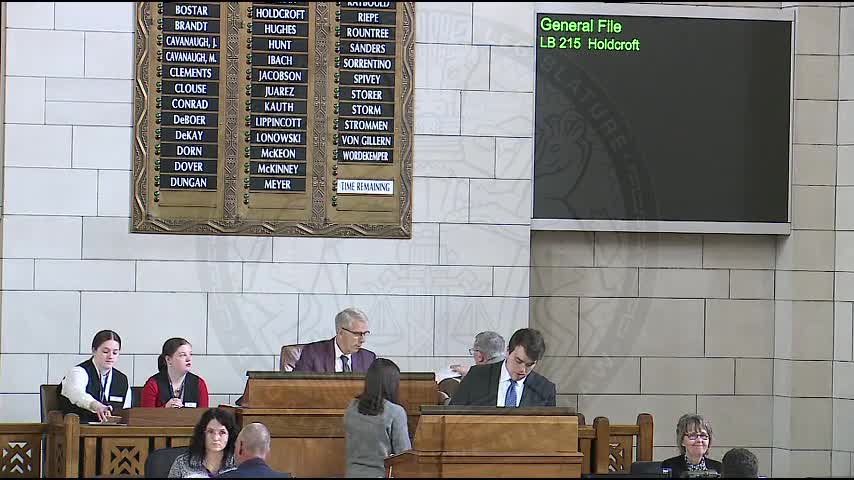Nebraska Legislature Considers Extending Term Limits to Three Terms
April 25, 2025 | 2025 Legislature NE, Nebraska
This article was created by AI summarizing key points discussed. AI makes mistakes, so for full details and context, please refer to the video of the full meeting. Please report any errors so we can fix them. Report an error »

The Nebraska Legislature's recent morning session on April 25, 2025, focused heavily on the adoption of the Clean Slate Act, which aims to provide commutations for certain incarcerated individuals, particularly those serving life sentences. This legislation is designed to offer a second chance to individuals who have demonstrated rehabilitation, particularly those who committed their crimes at a young age.
Senator Holcroft, a key proponent of the bill, emphasized the importance of rehabilitation over punishment, arguing that many lifers have become model inmates and pose no threat to society. The bill outlines specific eligibility criteria: individuals who committed their crimes before the age of 26 may be eligible for commutation after serving 25 years, while those who committed crimes at 26 or older must serve 30 years. The Department of Corrections will identify eligible candidates five years prior to their eligibility, allowing the Board of Parole to conduct thorough assessments and involve community stakeholders in the decision-making process.
The proposed legislation also includes tailored reentry plans for those granted commutation, which would encompass support in employment, housing, education, and mental health services. This comprehensive approach aims to ensure that individuals reintegrate successfully into society, reducing the likelihood of recidivism.
During the session, various senators expressed their support for the bill, highlighting its potential to positively impact the lives of rehabilitated individuals and the broader community. Senator McKinney noted that the bill is a common-sense approach to justice, allowing individuals who have worked hard to improve themselves a chance to contribute positively to society.
However, the session was not without contention. Some senators raised concerns about the implications for victims and their families, arguing that the focus on rehabilitation should not overshadow the rights and experiences of those harmed by crime. Senator Sorrentino and Senator Armendariz voiced strong opposition, emphasizing the need to consider the lasting impact of crimes on victims and the potential risks of releasing individuals who may still pose a threat.
Despite the debates, the session concluded with a vote to advance the bill, reflecting a growing recognition of the need for reform in Nebraska's criminal justice system. The Clean Slate Act represents a significant step towards addressing the complexities of rehabilitation and reintegration, aiming to balance public safety with the principles of justice and mercy. As the legislative process continues, the outcomes of this bill will be closely watched by both advocates and critics alike, as it seeks to reshape the future of incarceration and rehabilitation in Nebraska.
Senator Holcroft, a key proponent of the bill, emphasized the importance of rehabilitation over punishment, arguing that many lifers have become model inmates and pose no threat to society. The bill outlines specific eligibility criteria: individuals who committed their crimes before the age of 26 may be eligible for commutation after serving 25 years, while those who committed crimes at 26 or older must serve 30 years. The Department of Corrections will identify eligible candidates five years prior to their eligibility, allowing the Board of Parole to conduct thorough assessments and involve community stakeholders in the decision-making process.
The proposed legislation also includes tailored reentry plans for those granted commutation, which would encompass support in employment, housing, education, and mental health services. This comprehensive approach aims to ensure that individuals reintegrate successfully into society, reducing the likelihood of recidivism.
During the session, various senators expressed their support for the bill, highlighting its potential to positively impact the lives of rehabilitated individuals and the broader community. Senator McKinney noted that the bill is a common-sense approach to justice, allowing individuals who have worked hard to improve themselves a chance to contribute positively to society.
However, the session was not without contention. Some senators raised concerns about the implications for victims and their families, arguing that the focus on rehabilitation should not overshadow the rights and experiences of those harmed by crime. Senator Sorrentino and Senator Armendariz voiced strong opposition, emphasizing the need to consider the lasting impact of crimes on victims and the potential risks of releasing individuals who may still pose a threat.
Despite the debates, the session concluded with a vote to advance the bill, reflecting a growing recognition of the need for reform in Nebraska's criminal justice system. The Clean Slate Act represents a significant step towards addressing the complexities of rehabilitation and reintegration, aiming to balance public safety with the principles of justice and mercy. As the legislative process continues, the outcomes of this bill will be closely watched by both advocates and critics alike, as it seeks to reshape the future of incarceration and rehabilitation in Nebraska.
View full meeting
This article is based on a recent meeting—watch the full video and explore the complete transcript for deeper insights into the discussion.
View full meeting
